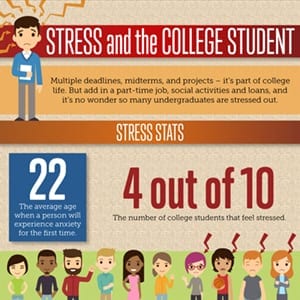
Stress and the College Student
Multiple deadlines, midterms, and projects – it’s part of college life. But add in a part-time job, social activities and loans, and it’s no wonder so many undergraduates are stressed out.
Stress Stats
• 22: The average age when a person will experience anxiety for the first time, according to the Anxiety and Depression Association of America
• 4 out of 10: The number of college students that feel stressed according to a 2008 study by the Associated Press and mtvU.
• 46.3 percent: The percentage of college students who feel completely overwhelmed by their academic responsibilities, according to the 2013 National College Health Assessment.
• 11 percent: The percentage of students who discussed their stress with a campus counselor, according to the 2014 American College Counseling Association survey.
A Compounding Factor Impacting Academic Success
According to the American College Health Association, the four factors students felt impacted their GPAs included:
• Stress
• Anxiety
• Work
• Sleep Difficulties
Spotting the Symptoms of Stress
Stress affects everyone different. Here’s a few typical symptoms of stress:
• Headache
• Feeling lightheaded
• Sweating or blushing
• Feeling overwhelmed
• Having problems concentrating
• Crying
• Mood swings, including anger, sadness, and loneliness
• Losing or gaining weight unexpectedly
Help from a Furry Friend?
A recent study by the Virginia Commonwealth University found that college students were less stressed during exams week if they spent time with a pet, such as a dog. Students who spent 15 minutes with a puppy felt better than those who didn’t – and there are groups who specifically bring dogs to campus to give students a brain break.
Students are turning to other forms of healthy stress relief too, including:
• Meditation
• Guided relaxation techniques
• Aromatherapy
Four Ways to Keep Calm
• Plan ahead. Knowing how to prioritize your coursework will relieve some of the worry come test time – and means you won’t have to pull an all nighter. Whether you pack a daily planner in your bag or use an app, setting study times will keep you on track. Don’t forget to schedule downtime, too.
• Stay active. Exercise reduces stress and produces feel-good endorphins. Hit the university gym and get on the treadmill, lift some weights or attend a yoga class to get your blood flowing.
• Eat right. Pizza and ramen aren’t food groups – and can leave you feeling bogged down. Try incorporating more fresh foods into your diet, including dark leafy greens, which can boost natural serotonin levels. Other stress-busting foods include turkey, salmon, yogurt, and blueberries.
• Know when it’s time to talk to someone. If you’re feeling anxious or sad all the time or stay holed up in your dorm room instead of going out with friends, or find it hard to get to class on time, it’s time to seek additional help. Schedule a time to sit down with your advisor or utilize the counseling services on campus. There are people who want you to succeed – you just have to reach out.
Sources:
http://www.adaa.org/finding-help/helping-others/college-students/facts
https://news.fiu.edu/2015/04/surveys-show-increase-in-stress-among-college-students/86911
http://college.usatoday.com/2016/04/14/success-secrets-college/
http://www.stress.org/stress-effects/
http://stress.lovetoknow.com/Statistics_on_College_Student_Stress
http://augustafreepress.com/vcu-study-finds-college-students-feel-less-exam-stress-visits-therapy-dogs/
http://psychcentral.com/lib/the-stressed-out-college-student/

 The Best Colleges
The Best Colleges The Lowest Costs
The Lowest Costs The Highest Returns
The Highest Returns